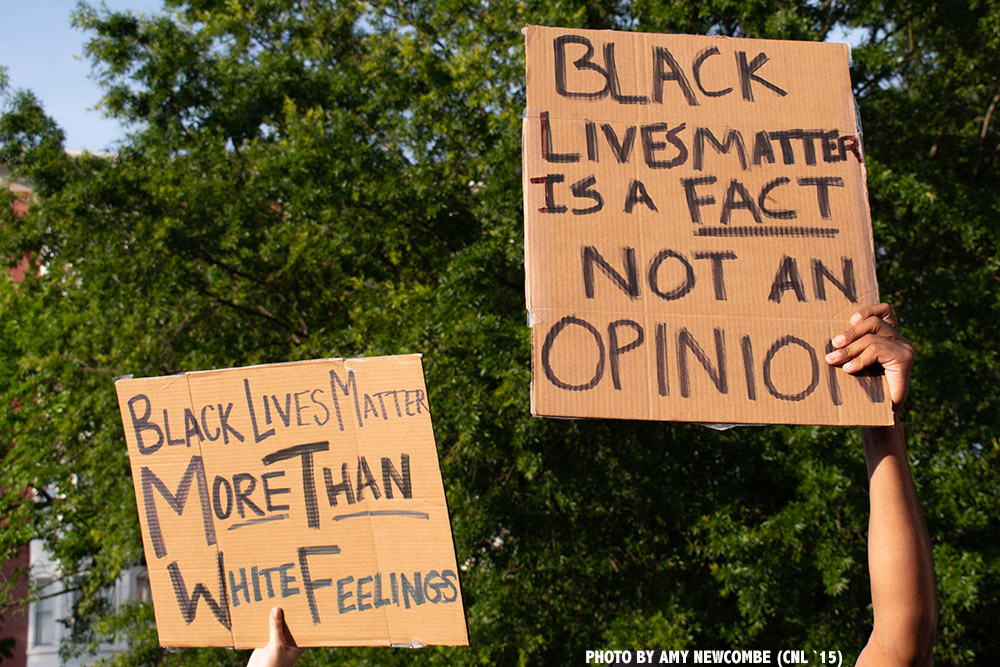
The Journey I'm On
Thirty-five years ago this summer,
I took my first class in a master’s program about psycho-social development theories and how they applied to—without actually saying it explicitly—mostly young, white, middle class college students. Although I don’t recall any discussion of whether these theories were “intersectional”—a word we wouldn’t have known then, anyway—I did decide by the end of that term that my personal philosophy would be guided by meeting students where they were.
Connection, I knew, would be my most powerful currency.
Sounds straightforward, right? But the truth is this work takes—on both sides— humility, patience, give and take, and heaps of trust.
But on the day George Floyd was murdered, I struggled with how, exactly, to respond. Was social media the place? A mass e-mail? Should I attend a protest? Every effort I could think of felt wrong, misplaced, even shallow, and I paused, uncertain of how best to connect, support, and care.
Paused until, unsurprisingly (nursing students really are the best), one of our own, Milania Harris, said to me in a simple email: We need to hear from you and we need to know the nursing school will act.
"All of us, and especially those like me who’ve benefitted from being part of powerful in-groups, must acknowledge we’re part of the problem, and try to foster change."
Theresa Carroll, senior assistant dean
It was exactly what I needed to hear. Less than a day later, as outrage poured into American streets, 30 nursing students met together with me and Susan Kools, associate dean for diversity and inclusion, on Zoom. We talked. We shared. Expressed how raw we felt. Worried together not just about society, and our futures, but about our nursing school, too. Because it—we—are part of the change that needs to happen. Even as the path toward racial justice and equity and inclusion is everyone’s work, it is also mostly white people’s work. And we have a lot of work to do.
The questions discussed on Zoom the day after Mr. Floyd’s death were heavy, and answers were scarce. What were we ourselves doing to contribute to racism and oppression? Were we really preparing our students to care for every single patient they encountered, no matter who they were? Were we listening hard to our students of color, taking note of what they experienced, felt, and observed? And as allies in this fight with them, were we willing to put in the effort required to create meaningful change by starting with ourselves?
These moments make me realize that it’s not enough to “meet people where they are.” For each of us, the determination to be an anti-racist, and an individual devoted to equity and inclusion, is a lifelong process requiring daily effort to make ourselves better: better teachers, better students, better nurses, better humans.
Every single one of us, and especially those of us, like me, who’ve benefited from being part of powerful in-groups, must acknowledge we’re part of the problem, and try to foster change. Just as I cannot rely on the foundational theories learned in 1985, or previous experiences with race and racism—I grew up in the South, after all, during segregation—I must make a daily commitment to be better, do better, try harder, and ask the same of my students, especially those with the same privileges as I’ve had.
I’ve been working with students for more than three decades, and it is expansive, humbling, exhausting, triumphant, emotional work that comes down to two basic tenets: developing trusting relationships and learning together. Today, I don’t want just to meet my students; I want to know them. Even if it sounds trite, I really mean it: I have learned as much from the thousands of students I’ve known as I hope they may have learned from me. And I have evolved in my role, as an educator, and a human—and I’m still evolving. When it came to Mr. Floyd’s death, it took a reminder from Melania to set me straight.
This is hard work, this work of race and inclusion, and the discussions we’re having in our school are not easy. Throughout the summer in our anti-racist study groups, we’ll continue dialogue about race, having difficult conversations with patients and peers, understanding the implicit bias that’s present in each of us, how LGBTQ content must be embedded in our learning, and how we can identify and root out racism and inequality in health care systems. All of this takes effort and patience, and requires us to be open and honest and show each other that we have a trusting relationship where we can work together.
Thirty-five years is a long time. I repeatedly ask myself: Am I still relevant? Are we, as academic leaders, doing the right things? Saying the right things? Acting in ways that will make a difference? Are we ourselves changing for the better?
I hope so, but I also know that I make mistakes, and have a lot to learn. The past few weeks, though, have made me realize, once again, that this effort—sometimes uncomfortable—will result in better, stronger, more aware human beings who will be the change they wish to see in our world.
Theresa Carroll is senior assistant dean for academic and student services at UVA School of Nursing, and head of the Office of Admissions and Student Services, where she’s worked since May 2000.
